En español, en français, em português.
Figures are showing that direct sales are going from strength to strength, becoming a very relevant channel, or even the main channel, in the channel mix. Efforts to enhance the direct channel are paying off, but they should also prompt us to ask what can we do to improve it further.
We have already talked about how to maintain or increase our share of direct sales after the pandemic, but it is time to take it a step further and consider a disruptive change: do away with fixed budgets for paid campaigns.
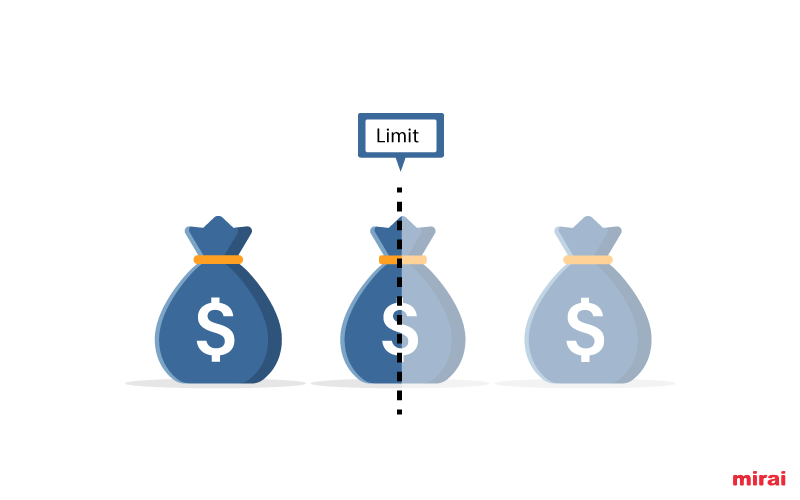
The truth about paid campaigns
Currently, paid campaigns (Google, Facebook, Bing, etc.) tend to represent 30% to 50% of total bookings for our direct channel, either through direct or assisted conversion. This is a large percentage that is unlikely to change in the short term, considering that each platform offers increasing visibility for paid versus organic campaign results. Furthermore, high competition from other players, both in branding and prospecting campaigns (generic campaigns), ensures that potential customers will always be impacted by a paid advertisement before an organic result.
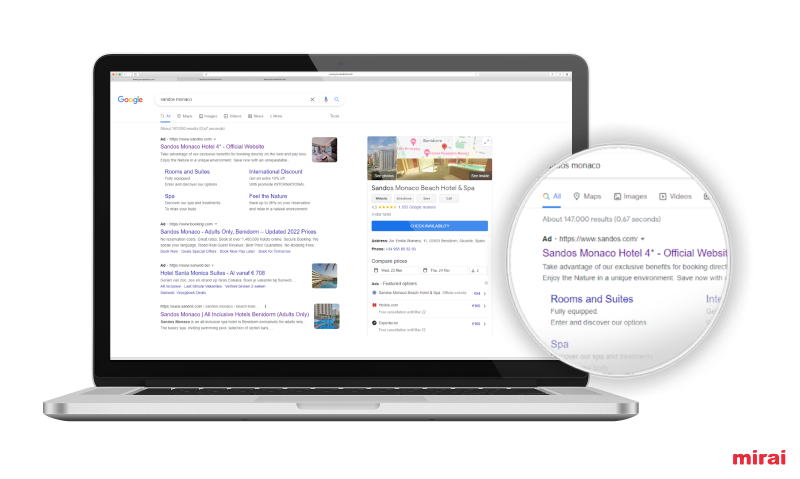
In digital marketing, we can see where every euro has been invested, the impact it has generated, how it has performed, etc., and all in almost real time. In this scenario, in which you have up-to-date data and a previously unimaginable level of control (segmentation, retargeting, automation, etc.), you have to ask yourself whether you have adapted to get the most out of this opportunity or whether you still consider digital marketing as an expense rather than an investment.
The figures support the decision
Investing in paid traffic campaigns is profitable for all sectors, including the hotel industry. Depending on the average booking cost, the commission on branding campaigns in the Google ecosystem can range between 2%-7%, assuming that they are customers who are already familiar with us, or, at the very least, have searched for the name of the hotel. Even taking into account cancellations, the final figures are much better than those from other booking channels, in most cases.
What about new customers? Can we acquire them at a profitable margin? How much would you be willing to pay for them? By taking advantage of the low commission on branding campaigns, we can accept a higher commission on prospecting campaigns. These campaigns may not initially be more profitable than other channels, but that should not be a reason to rule them out. It is our responsibility to analyse all the data as a whole, and to consider whether the overall results are in line with our objectives.
This is a clear example of a situation in which focusing on one tree prevents us from seeing the whole forest. Is it better for a hotel to pay a commission of 3.5% for 100 bookings per month through branding campaigns only, or for the same hotel to pay 10% commission for 200 bookings per month through branding and prospecting campaigns?
Let’s assume an average price of €300 per stay. In the first case, we invested €858, generating a revenue of €30,000, while in the second case, with an investment of €6,000, we have generated a return of €60,000. We have not only generated more business (and that is without considering upselling opportunities and on-site customer spending), but we have done so by acquiring new customers (taking them away from the competition) and feeding the direct channel, allowing us to depend less on other, more costly channels.
Hoteliers are clearly committed to the direct channel, and are aware that it is an important part of their channel mix, but they have to have faith in its current and future profitability.
The downside to fixed budgets for paid campaigns
This scenario is well known to most of the industry, which has embraced investment in paid campaigns as a fundamental pillar of the direct channel. However, contrary to the logic of the hotel industry, which is always looking for the highest profit, the effectiveness of a channel that has the figures to prove its profitability on a daily basis is being restricted.
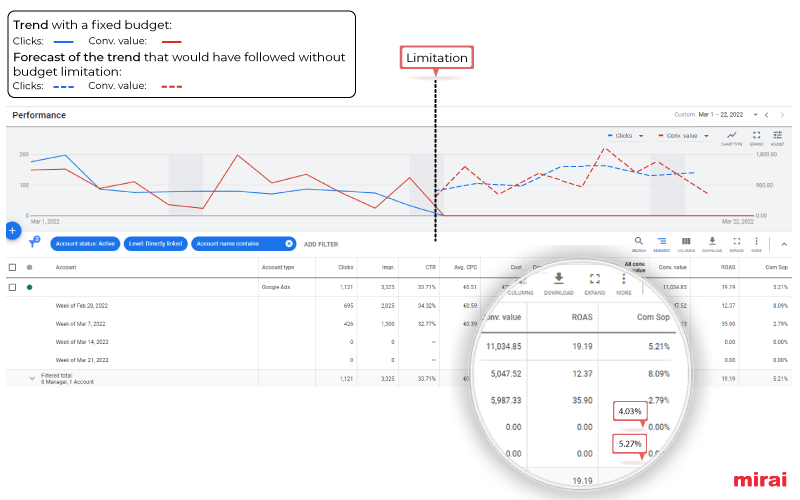
This restriction has an impact on the effectiveness of both current and future campaigns:
- Limited market expansion: If we are working with a fixed budget, the most logical thing to do is to estimate the budget based on our performance in previous years in the markets in which we had a presence. It makes sense, but it will limit our ability to embrace potential growth in other markets, which are possibly even more profitable than our current markets.
- Inability to react to incremental demand: In a global scenario as volatile as it has been in recent years, we should not assume that past performance guarantees future results. It is very difficult to make realistic estimates and, if we stick to them, we are likely to miss out on the opportunities for increasing demand that have been so prevalent in recent months.
- Loss of bookings compared to other channels or competition: The main consequence of not having enough budget, not even to cover brand searches, leads to the logical consequence that our monthly budget runs out before the end of the month, or that we simply cannot compete in that market at all. Covering the first organic result does not guarantee enough visibility for the user to discard the first 4 advertising options (including ad extensions, images, highlights, etc.) that are presented to them, or to scroll down the screen until they find the first organic result. The consequence? The booking is lost from the direct channel to another less profitable channel, or even to the direct competition.
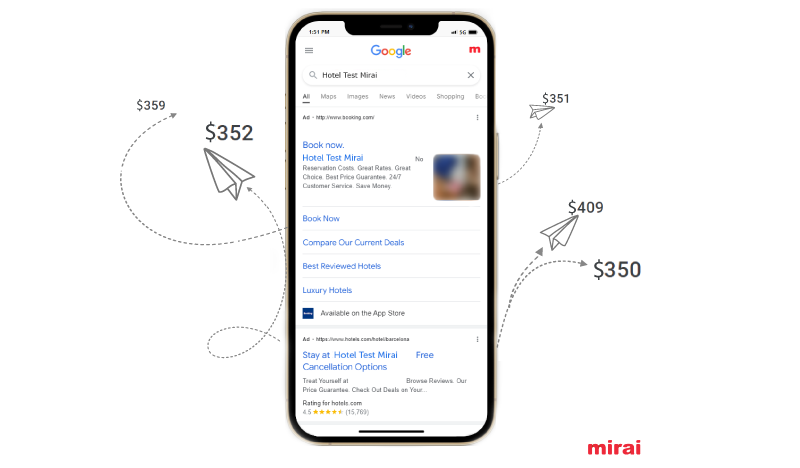
- Untapped business opportunities: In relation to the previous point, many hoteliers fail to identify the difference in value between bookings through a direct channel and bookings through any other channel. The figures show that the commission incurred is lower, and the average spend is higher for direct bookings, thanks to exclusive offers and other opportunities, such as having a good upselling strategy. In addition, direct acquisition makes it much easier to encourage registration to your loyalty club, and reduces acquisition costs for future campaigns.
- Under-optimisation of advertising campaigns: Advertising platforms have come a long way in recent years, creating intelligent algorithms that learn from the information they receive. What happens if our campaigns are under-budgeted, are stopped intermittently due to budget, or don’t get enough conversions to feed the algorithm? They perform worse than others, resulting in a higher CPC (for branding campaigns and even more for prospecting campaigns) and an unstable CPA that does not provide the system with a reference point for optimisation. These practices compromise the performance of current campaigns and condition the performance of future campaigns.
- Wasted opportunities due to reliance on performance: Although the main objective of campaigns is to increase the number of bookings while maintaining acceptable levels of commission, we all know that it is hard to get very different results if we always do the same thing. Having a fixed budget can limit us from experimenting with new avenues that could potentially achieve better results. Initiating actions on previously overlooked platforms, with less competition, can represent an opportunity for growth that we may have overlooked because we are unable to dedicate an exclusive budget to it, and because we are overly dependent on the immediate performance of campaigns.
- Missed opportunities in the customer decision-making process: We know that the decision to make a hotel booking is rarely based on a fleeting impulse. It is a process in which the potential customer makes a large number of interactions with the hotel (profile visits on social media, website, Google My Business page, advertisements, etc.) before making the booking. Maintaining active paid campaigns guarantees our presence in this complex decision-making process and, above all, prevents another channel from “stealing” a direct booking from us, simply because we were not in the right place at the right time.
- Forgotten first-party data: This is going to be one of the most differentiating factors in the future of marketing. All the first-hand information we have collected from users who have interacted on our platforms is a differential element with respect to the competition, and can make a difference in the customer’s decision-making process. Who wouldn’t like to be offered a personalised discount at one of the chain’s hotels just two weeks before the date they booked at one of our hotels last year? Coincidence? First-party data allows us to carry out extremely precise actions and, in a world in which data protection is becoming more and more relevant, and in which the large advertising platforms are having problems adapting to the privacy policies of the different government entities, the expression “information is power” is becoming more and more meaningful. Having a database of users, potential or repeat customers, can provide a turning point with respect to the competition in our future campaigns and a differential advantage that allows us to have an impact on the right people. With this in mind, the importance of users who visit our website or register for our loyalty programme cannot be underestimated.
What do you need for a flexible budget?
- Additional budget for your campaigns or, ideally, no budget limit.
- A team of experts to manage your campaigns, either internally or externally.
- Constant monitoring.
- Automations to pause or reactivate campaigns.
- An accurate tracking tool.
- A booking engine with highly accurate and detailed tracking.
- A comprehensive monthly reporting system.
If you entrust your digital marketing campaigns to Mirai, you can rest assured that we will provide all these features so that you can control your costs without limiting your direct sales potential.
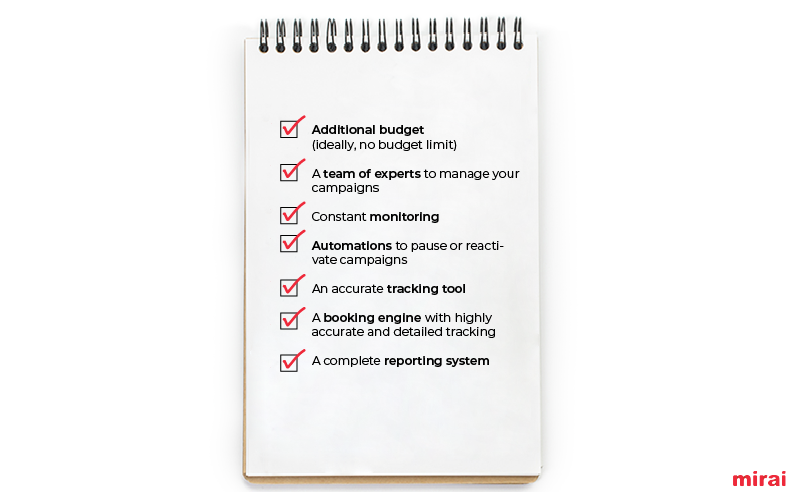
From spending to investment, a logical evolution
One of the most surprising things is that, in the hotel world, where the commission model is perfectly integrated into everyday business and is more of a necessity than an opportunity, the money spent on paid advertising campaigns is seen as an “expense” rather than an investment.
In the hands of the right professionals, paid campaigns are a valuable resource that can be optimised to return a much higher ROAS than other channels. With in-depth knowledge of the global market and collaboration with customers who can provide specific insights, together with quick reactions when adapting to new needs, we can minimise risks and get the most out of every euro invested.
Setting a fixed budget may seem like a logical way to control spending, but it limits the possibilities of our direct channel and, above all, limits our potential. Let’s take advantage of the opportunities available to us and make the most of all the work we have done to enhance our websites.
This is the type of advice we offer at Mirai based on our experience and knowledge of the sector. If you would like to know more about how we can help you, please contact us at miraidigital@mirai.com.



